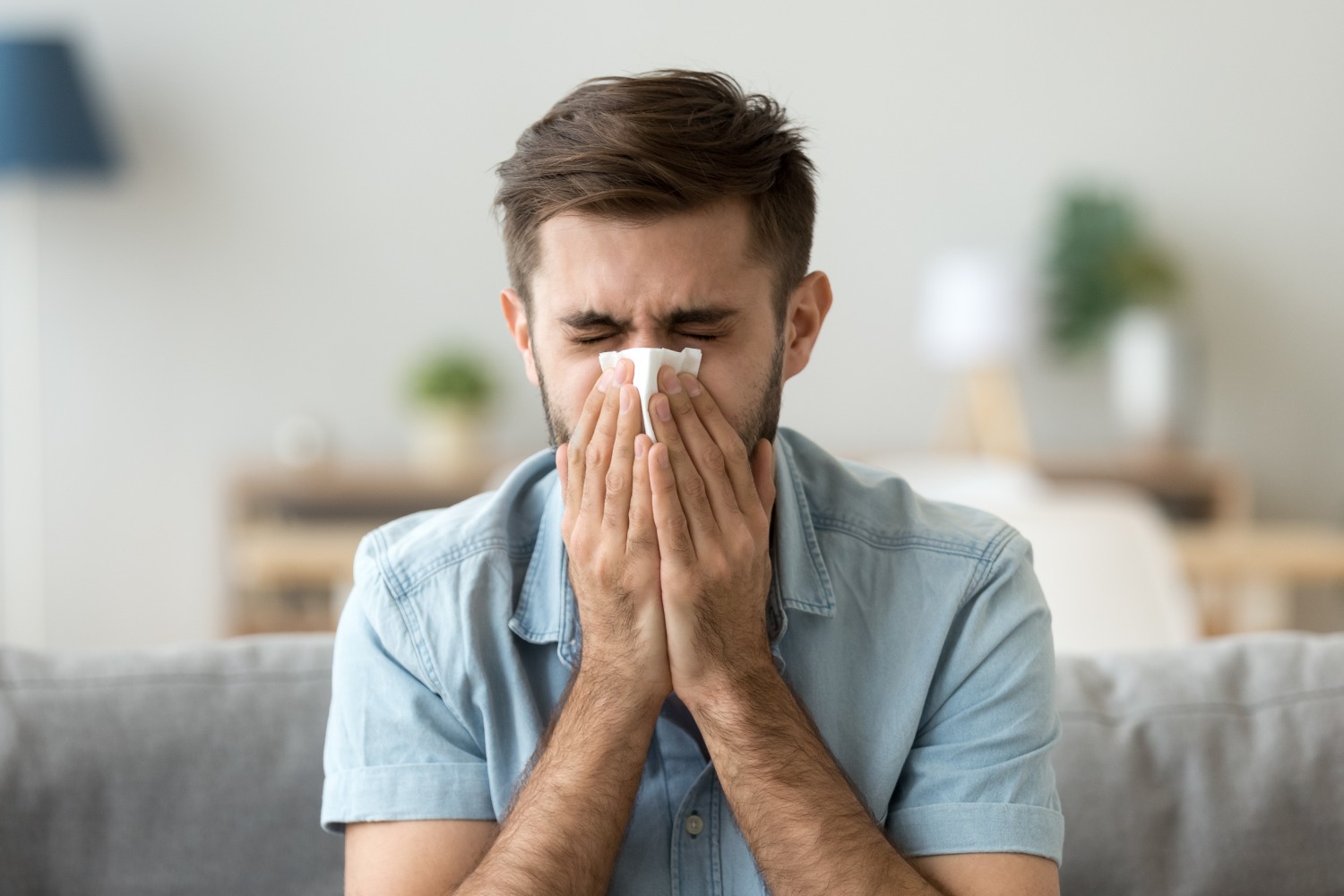Seasonal allergies can be a significant hindrance to the enjoyment of outdoor activities. The sneezing, itchy eyes, and general discomfort that come with these allergies often make people dread the changing seasons. The primary culprits behind these symptoms are often natural grasses that release pollen into the air, triggering allergic reactions in many individuals.
However, a solution that is gaining popularity is the use of artificial grass. This synthetic turf, often used in sports fields and residential lawns, is now being recognized for its potential to alleviate seasonal allergies. Artificial grass installation is becoming a common choice for us at Cricket Pavers and for those seeking to enjoy their outdoor spaces without the worry of triggering their allergies.
Artificial grass, also known as synthetic turf, is a surface made from synthetic fibers designed to look like natural grass. It’s not just for sports arenas or commercial properties anymore. More and more homeowners and event organizers are turning to artificial grass for its many benefits, including its hypoallergenic properties. This growing interest in artificial grass products is not just a trend, but a response to a real issue affecting many people’s quality of life.
So, how exactly does artificial turf help with seasonal allergies? Let’s delve into the science behind this and explore why artificial grass might be the answer to your allergy woes.
Understanding Artificial Turf
Description and Key Features of Artificial Turf
Artificial turf, also known as synthetic grass, is a surface made from synthetic fibers designed to mimic the appearance of natural grass. It is a popular choice for:
- sports fields,
- commercial properties,
- residential lawns.
High-quality artificial grass offers a lush, green, and realistic look that can enhance the aesthetic appeal of any space.
One of the key features of artificial turf is its durability. Unlike natural grass, synthetic turf can withstand heavy foot traffic and harsh weather conditions, making it a long-lasting solution for outdoor spaces. Additionally, artificial grass suppliers often offer a variety of options, including pet-friendly synthetic turf and eco-friendly artificial grass, catering to a wide range of needs and preferences.
Another significant feature of artificial turf is its hypoallergenic properties. Since it is synthetic, it doesn’t produce pollen, a common trigger for seasonal allergies. This makes it an excellent choice for those who want to enjoy their outdoor spaces without worrying about allergy symptoms.
Comparison of Artificial Turf with Natural Grass in Terms of Maintenance and Allergen Factors
When comparing artificial turf with natural grass, there are several factors to consider, particularly in terms of maintenance and allergen factors. Natural grass requires regular watering, mowing, and fertilizing to stay healthy and attractive. On the other hand, artificial turf maintenance is relatively straightforward, requiring only occasional rinsing and brushing to keep it looking its best.
From an allergen perspective, natural grass can be a significant source of pollen, especially during the spring and summer months. This can trigger allergic reactions in susceptible individuals, causing symptoms such as:
- sneezing,
- itchy eyes,
- runny nose.
In contrast, artificial lawn grass does not produce pollen, making it a more suitable option for those with seasonal allergies.
Furthermore, artificial grass installation can be a cost-effective solution in the long run. While the initial cost may be higher than natural grass, the savings in water bills and maintenance costs over time can make it a worthwhile investment.
Whether for residential artificial grass or commercial synthetic turf, the benefits of artificial grass extend beyond its aesthetic appeal, offering a practical and hypoallergenic solution for outdoor spaces.
The Relationship Between Artificial Grass and Allergens
Explanation on How Artificial Grass Helps Minimize Exposure to Common Allergens
Artificial grass has a significant advantage over natural grass when it comes to allergens. Natural grass is a common source of pollen, a potent allergen that can trigger symptoms in people with seasonal allergies. However, artificial lawn grass does not produce pollen, effectively eliminating this common allergen from your outdoor spaces.
Moreover, artificial grass is not susceptible to many of the common lawn pests that can cause allergic reactions. For instance, it does not harbor dust mites or support the growth of mold and fungi, all of which can trigger allergies. This makes artificial grass a hypoallergenic option, ideal for those who want to enjoy their outdoor spaces without the worry of triggering their allergies.
Artificial grass installation also eliminates the need for chemical fertilizers and pesticides, which can also cause allergic reactions in some people. This makes it an eco-friendly artificial grass option that is safe for both people and pets.
Discussion on Studies and Facts Supporting the Allergy-Reducing Benefits of Artificial Turf
Several studies and facts support the allergy-reducing benefits of artificial turf. For instance, a study published in the Journal of Allergy and Clinical Immunology found that synthetic grass products significantly reduced the presence of airborne grass pollen, a common trigger for seasonal allergies.
Furthermore, the American Academy of Allergy, Asthma, and Immunology (AAAAI) states that synthetic turf can help reduce exposure to allergens. According to the AAAAI, synthetic turf does not support the growth of mold and fungi, common allergens that can thrive in natural grass under certain conditions.
Artificial grass suppliers often highlight these benefits, positioning synthetic turf as a practical solution for those suffering from allergies. Whether it’s indoor synthetic grass for a playroom or outdoor artificial turf for a backyard, the allergy-reducing benefits of artificial grass are clear. By choosing artificial grass, you’re not only investing in a durable synthetic lawn but also in a solution that can help improve your quality of life by reducing exposure to common allergens.

Implementing Artificial Grass for Reduced Allergies
Guide on How to Correctly Install and Maintain Artificial Grass for Optimal Benefits
Proper synthetic turf installation and maintenance are crucial to reaping the full benefits of artificial grass, including its allergy-reducing properties. The installation process involves several steps, including ground preparation, laying the turf, and securing it in place. It’s recommended to hire professionals for artificial grass installation to ensure it’s done correctly and to maximize its lifespan and effectiveness.
Artificial turf maintenance is relatively straightforward compared to natural grass. It doesn’t require watering, mowing, or fertilizing. However, it does need occasional rinsing to remove dust and debris and brushing to keep the fibers upright. These simple maintenance steps can help maintain the aesthetic appeal and hypoallergenic properties of your artificial lawn grass.
Whether you are considering residential artificial grass or commercial synthetic turf, proper installation and maintenance are key. By investing in high-quality artificial grass and ensuring it’s correctly installed and maintained, you can enjoy a beautiful, durable synthetic lawn that also helps reduce exposure to allergens.
Showcase of Real-Life Examples Where Artificial Turf Has Mitigated Allergy Symptoms
There are numerous real-life examples of how artificial turf has helped mitigate allergy symptoms. For instance, many schools and sports facilities have switched to artificial turf to create a more allergy-friendly environment. This has resulted in a noticeable reduction in allergy symptoms among students and athletes, allowing them to participate in outdoor activities without the worry of triggering their allergies.
Similarly, many homeowners have reported a significant improvement in their allergy symptoms after replacing their natural grass lawns with artificial turf. They have been able to enjoy their outdoor spaces more, without the sneezing, itchy eyes, and other discomforts associated with seasonal allergies.
These examples highlight the potential of artificial grass as a practical solution for reducing exposure to allergens. By choosing artificial grass, you are not just investing in a low-maintenance, eco-friendly landscaping option, but also in a solution that can help improve the quality of life for those suffering from allergies.
Reflecting on the Benefits of Artificial Grass for Allergy Sufferers
Throughout this discussion, we have explored the many benefits of artificial grass, particularly its potential to alleviate seasonal allergies. We’ve delved into the science behind this, understanding how the hypoallergenic properties of artificial turf can significantly reduce exposure to common allergens found in natural grass.
From its lack of pollen production to its resistance to mold and fungi growth, artificial grass presents a practical solution for those seeking to enjoy their outdoor spaces without the worry of triggering their allergies.
Moreover, we have examined the process of synthetic turf installation and maintenance, highlighting the importance of these steps in maximizing the benefits of artificial grass. Whether for residential or commercial use, proper installation and maintenance can ensure the longevity and effectiveness of artificial grass, making it a worthwhile investment.
Real-life examples have further underscored the positive impact of artificial turf in the lives of those suffering from seasonal allergies. From schools and sports facilities to residential lawns, the switch to artificial grass has resulted in a noticeable reduction in allergy symptoms, enabling individuals to participate in outdoor activities with greater comfort and peace of mind.
In conclusion, artificial grass offers more than just aesthetic appeal and low maintenance. Its allergy-reducing properties can significantly improve the quality of life for those suffering from seasonal allergies, making it a practical and beneficial choice for outdoor spaces.
As we continue to seek solutions that promote health and well-being, artificial grass stands out as a promising option, offering a breath of fresh air for those plagued by seasonal allergies so call us today and get rid of allergies for good!




